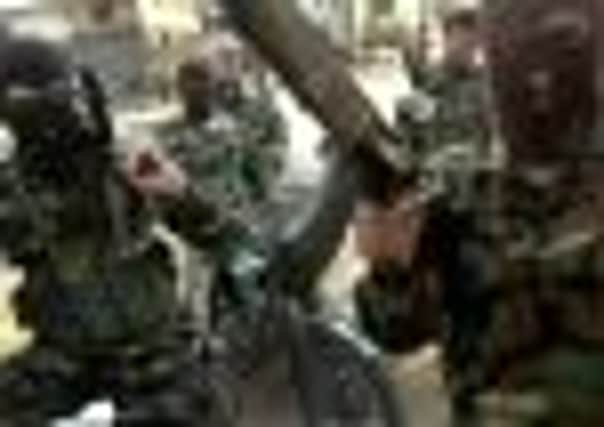Rebels target Syria’s oil artery with attack on Homs pipeline


The blast caused no casualties but sent a plume of black smoke into the sky. A government official said the blast caused a fire that burned for hours.
“An armed terrorist group on Thursday committed an act of sabotage,” the state-run SANA news agency said.
Advertisement
Hide AdAdvertisement
Hide AdIt was not clear who was behind the pipeline explosion, which came at a time when violence in Syria is spiralling out of control, unearthing long-standing grievances and resentments.
The opposition accuses the government of playing on fears of religious extremism and terrorism to rally support behind president Bashar al-Assad, who has portrayed himself as the only force that can stabilise the country.
There were two similar attacks on Syrian pipelines in July and it is still not known who was behind them. One possibility is the Free Syran Army – composed largely of defectors from the regular forces – as the Homs area can be regarded as its main bastion of support.
Nomair Makhlouf, the general director of the Syrian Oil Company, said the pipeline served Syria’s domestic requirements and carried the equivalent of about 140,000 barrels a day.
With oil exports effectively suspended owing to sanctions, Syria has plenty of raw petroleum in stock, but it has limited refining capacity, of which the Homs installation now in a hub of the conflict is a key part.
Activists also said yesterday security forces killed up to 14 people, most of them in Homs.
Homs is a city of 800,000 people where activists say about 1,500 have been killed in total in Mr Assad’s crackdown on anti-government protests.
Syria is trying to crush a nine-month-old popular uprising, but the conflict is turning more violent as once-peaceful protesters increasingly take up arms.
Advertisement
Hide AdAdvertisement
Hide AdOn Wednesday, Mr Assad claimed in a rare TV interview that he did not order the brutal suppression of the uprising and insisted only a “crazy person” would kill his own people.
Mr Assad – whose family has ruled Syria for 41 years – is under growing international pressure, in part from sanctions imposed by Turkey, the Arab League and the European Union aimed at squeezing the ailing economy and forcing the regime to halt the bloodshed.
The EU has banned oil imports from Syria in a move that costs the embattled regime millions of dollars each day. But the sanctions are also hurting Syria’s trading partners in the region.
Protesters are calling for a peaceful “dignity strike” by Syrians at the weekend, in what organisers hope will build into a general campaign of civil disobedience. Schools, universities, shops, public transport and government services are being urged to refuse to work on Sunday and close highways.
In Homs and nearby areas in north-western Syria, people staged a general strike on 26 October, partly enforced by armed insurgents.
But the two biggest cities of Damascus and Aleppo were largely unaffected, and residents of the capital said yesterday that authorities appeared to be taking steps to thwart Sunday’s planned action.
Some shopkeepers who sought to pay their bills to the government this week said they were told to wait until Sunday when officials would visit to collect the money – a veiled warning not to be closed.
Meanwhile, Russia, which is keen to avert any foreign intervention of the kind that toppled Libyan leader Muammar al-Gaddafi, yesterday warned Nato states that outsiders should not “pick and choose the sweethearts” in Arab conflicts that were potentially sectarian.
Advertisement
Hide AdAdvertisement
Hide AdForeign minister Sergei Lavrov told counterparts at Nato headquarters: “We are, to be very frank with you, extremely concerned with the fact that we are seeing [a] growing divide within the Islamic world, between the Sunni and the Shiite.”
Nato secretary-general, Anders Fogh Rasmussen, reiterated that the organisation had “no intention whatsoever to intervene in Syria”.